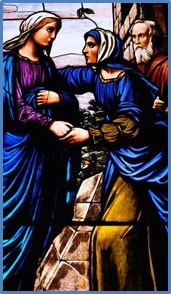 He then goes on to speak about the division that will ensue because of his coming. Jesus makes it clear that to be his disciple will not be easy and as followers, we will face difficulties. I imagine many of you are nodding in agreement. In the first reading from Jeremiah (38:4-6, 8-10), Jeremiah is rejected because of his prophetic teachings and is thrown down a well, left to starve. It seems to me the mark of being a true disciple of Jesus is to be questioned, misunderstood and rejected because the message of real love is too hard and too confronting.
He then goes on to speak about the division that will ensue because of his coming. Jesus makes it clear that to be his disciple will not be easy and as followers, we will face difficulties. I imagine many of you are nodding in agreement. In the first reading from Jeremiah (38:4-6, 8-10), Jeremiah is rejected because of his prophetic teachings and is thrown down a well, left to starve. It seems to me the mark of being a true disciple of Jesus is to be questioned, misunderstood and rejected because the message of real love is too hard and too confronting.
I recall a wonderful image given to us by Fr Richard Lennan when he was speaking to us last week. He spoke of darkness and how hard it is to achieve complete darkness. For absolute darkness to exist, there can be no light at all. Only when there is no light can it be said that darkness exists. It just takes one flicker of light to break the darkness. The necessary conclusion is that light is more powerful than the dark. We talk of the light that shines in the darkness.
While at the Diocesan Pastoral Ministries meeting last Thursday, I was introduced to the following lyrics which I have not been able to eliminate from my musical memory. I have gone to sleep and woken up with the melody:
Sacred Flame (sung to the tune of Shenandoah) by Erica Marshall
Sacred Flame, you burn within us,
light the road before us.
may we walk your ways of mercy.
bless our feet, O bless our hearts.
Be with us on our journey.
This certainly fits with my messages of the past two weeks, in which I have been sharing with you our faith as pilgrims on a journey. As pilgrims, we are continually invited to be drawn deeper into the mystery, both in this life and beyond death.
 Interestingly, I am sitting at my desk on Monday 15th August writing this message, which is usually done on a Sunday evening; so accompanying this message is the Feast of the Assumption. Our belief is that Mary was assumed body and soul into heaven, having completed the course of her earthly life. She was assumed totally into the mystery of who God is at the moment of her death. For us the journey may go on for some time beyond our death, but for Mary that moment was instantaneous.
Interestingly, I am sitting at my desk on Monday 15th August writing this message, which is usually done on a Sunday evening; so accompanying this message is the Feast of the Assumption. Our belief is that Mary was assumed body and soul into heaven, having completed the course of her earthly life. She was assumed totally into the mystery of who God is at the moment of her death. For us the journey may go on for some time beyond our death, but for Mary that moment was instantaneous.
 I hope some of you are viewing a series on the ABC TV called “Forces of Nature” featuring Professor Brian Cox. He is an English physicist who explores the many wonders of the universe with great knowledge, passion and love. I thoroughly enjoy watching the images and listening to his commentary. He says that the universe is “beautiful to look at and even more beautiful to understand”. This program leads me to have no doubt that we are being drawn more deeply into the mystery which we call God.
I hope some of you are viewing a series on the ABC TV called “Forces of Nature” featuring Professor Brian Cox. He is an English physicist who explores the many wonders of the universe with great knowledge, passion and love. I thoroughly enjoy watching the images and listening to his commentary. He says that the universe is “beautiful to look at and even more beautiful to understand”. This program leads me to have no doubt that we are being drawn more deeply into the mystery which we call God.
So when Mary receives news of her pregnancy and that of her cousin Elizabeth, she takes off to visit Elizabeth and to spend some months with her, no doubt looking after her. The reading (Luke 1:46-55) which describes the meeting of the two women and the child leaping in Elizabeth’s womb is most delightful. Here we have the scene of two pregnant women joyous with each other’s good news.
Then Mary responds with her hymn of praise, the Canticle of Mary, or as we have come to know it, the Magnificat, with grace and humility.
My soul magnifies the Lord
And my spirit rejoices in God my Saviour;
Because He has regarded the lowliness of His handmaid;
For behold, henceforth all generations shall call me blessed;
Because He who is mighty has done great things for me,
and holy is His name;
And His mercy is from generation to generation
on those who fear Him.
He has shown might with His arm,
He has scattered the proud in the conceit of their heart.
He has put down the mighty from their thrones,
and has exalted the lowly.
He has filled the hungry with good things,
and the rich He has sent away empty.
He has given help to Israel, his servant, mindful of His mercy
Even as he spoke to our fathers, to Abraham and to his posterity forever.
She praises God whose mercy is from generation to generation, by:
- scattering the proud,
- overcoming the powerful
- lifting up those who are lowly
- feeding the hungry.
This is what we are being asked to do as followers of Jesus. This is the nonviolent way to mercy, peace, justice, freedom, reconciliation, order, personal dignity and harmony. It is God’s grace that promotes communion and reconciliation with God, all people and the physical world. There is a oneness in the universe, and we humans have the God-given gift and capacity to explore this unified potential in all things. Some are calling for a separation of the rational from the non-rational, the cognitive intellect from the capacity to imagine and dream, and demonising those who believe in a higher mystery as the cause of violence, hatred, division and war.
I think Fr Richard Lennan summed this up beautifully in his presentation to diocesan and Catholic Leaders on Friday 5th August. I provide you with the summary he gave us about a “catholic” Spirituality:
- At home with God as “bigger” [mystery]: view all of life as an expression of the God who gives life, and who is always greater; God is the source of the fullness of life, which we experience as not yet…. but already.
- Christ-ian: God’s self-communication in Jesus Christ not only affirms all that exists – the material world, history, culture, relationship, “the everyday” – as expressions of grace, it promises and guarantees that life will always overcome death, that nothing created can be beyond the reach of grace.
- Spirit-ual: the Holy Spirit, as grace, guides all creation to its fulfillment in Christ; at work in the present, the Spirit fosters reconciliation not separation, openness not exclusion, participation not control, and creativity not boredom.
- Ecclesial: the Spirit, who draws together all that God creates, has a particular relationship to the church as the community of faith in Christ, working not only for the inner unity of the church, but its openness to unity with all of God’s creation so that it might be, in Christ, a light for the nations.
- Oriented to service: responding to the Spirit of Christ expresses itself in generosity, compassion, justice, forgiveness; God’s grace promotes communion and reconciliation with God, all people and the physical world.
- Characterised by: trust, imagination, the willingness to be inclusive, to seek understanding, to affirm whom/whatever expresses the Spirit, and to accept the need for conversion, risk, dialogue, pilgrimage and openness to the future.
How amazing is the link between our daily scripture passages and the life we are attempting to understand and live. Thanks to Richard Lennan for his generous sharing of time and insight. I hope it continues to form us as a community of believers who live our faith with hope and love every day.
And so I finish this message where I began and invite you to sing these words:
Sacred Flame (sung to the tune of Shenandoah) by Erica Marshall
Sacred Flame, you burn within us,
light the road before us.
may we walk your ways of mercy.
bless our feet, O bless our hearts.
Be with us on our journey.

